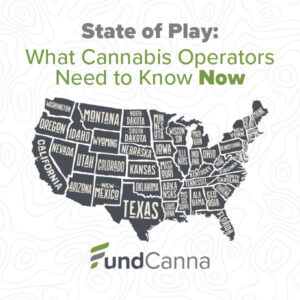"Those of us who were not necessarily eager to legalize pot have lost."
Written by Adam Stettner - FundCanna Founder & CEO
When a conservative senator publicly concedes that the war on cannabis is over, it marks a turning point. On June 25, Sen. Thom Tillis (R-N.C.) told the Senate Judiciary Committee that "those of us who were not necessarily eager to legalize pot have lost," and called on Congress to "regulate cannabis like alcohol and tobacco." It was a rare moment of bipartisan clarity—and for conservatives, an invitation to lead.
His remarks reflect a growing consensus: roughly 88% of American adults now support legalizing cannabis in some form. Yet at the federal level, cannabis remains tied to archaic laws and outdated stigma, even as adult-use markets flourish across 41 states. This Kafkaesque patchwork creates confusion, enables illicit activity, and blocks progress. That isn’t symbolic; it’s structurally harmful.
Entrepreneurs, from dispensary owners to cultivators, are taxed at rates as high as 70 percent under Section 280E of the federal tax code. Originally designed to punish drug traffickers, this rule bars cannabis businesses from deducting basic operating expenses like rent, payroll, insurance, utilities, or marketing. It forces law-abiding companies to operate under financial strain no other legal industry faces.

Meanwhile, law enforcement must navigate a contradictory legal landscape. Officers are expected to uphold federal laws that conflict with state ones, and cartels exploit the inconsistencies. According to the DEA, many illicit grows are linked to transnational criminal organizations that use trafficked labor and supply unregulated product to consumers nationwide. This isn’t just a regulatory issue. It’s a public safety threat.
State and local governments are also missing out on major tax revenue. Legal cannabis markets generated $4.4 billion in state taxes in 2024—a single-year record. Since adult-use legalization began, states have collectively brought in over $24 billion in revenue. These dollars fund schools, infrastructure, and public services. In some towns, dispensaries generate half the local sales tax base. Yet under federal law, cannabis businesses remain locked out of traditional banking, investment, and fair taxation.
Even product safety is at risk. Cannabis labeling, potency standards, packaging, and testing protocols vary widely by state. Consumers in one jurisdiction may unknowingly buy products that would fail safety checks just across the border. Federal oversight would ensure consistent standards—just like we already expect with alcohol, tobacco, and pharmaceuticals.
A clear solution is available: reschedule cannabis from Schedule I to Schedule III and establish a federal framework similar to those already used for alcohol and tobacco. This wouldn’t erase state control. It would provide consistency, predictability, and accountability. Under this model, states retain the right to allow, prohibit, or regulate cannabis based on local preferences—but within a unified national structure.
The legal cannabis industry already supports nearly 450,000 full-time jobs. These aren’t just growers and budtenders. They include accountants, software engineers, compliance officers, manufacturers, packaging specialists, and logistics professionals. In many states, cannabis workforce development programs are already preparing students for careers in the sector. With federal support, that momentum could grow nationwide.
Some conservatives may hesitate, fearing this issue belongs to the left. But this isn’t about culture. It’s about coherence. It’s about economic vitality, regulatory fairness, and public safety. It’s about acknowledging where the country already is and shaping responsible policy around it.
Senator Tillis offered a candid acknowledgment of where we stand. That honesty should be met with action. Legal cannabis is here. The only question is whether Congress will regulate it intelligently, or continue a broken status quo that serves neither business, public safety, nor conservative principles.
Get the working capital you need. Fast.
Approvals in as little as 24 hours
More From Our Blog
Follow Us
Explore
info@fundcanna.com















